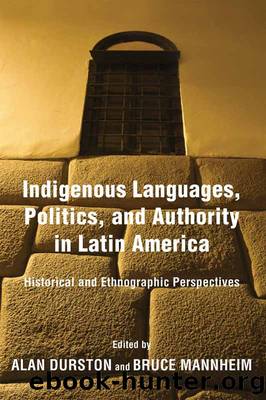Indigenous Languages, Politics, and Authority in Latin America by Alan Durston Bruce Mannheim

Author:Alan Durston, Bruce Mannheim [Alan Durston, Bruce Mannheim]
Language: eng
Format: epub
ISBN: 9780268103699
Barnesnoble:
Publisher: University of Notre Dame Press
Published: 2018-05-30T00:00:00+00:00
STAGE 1: GUARANI TRANSLANGUAGE (1585â1684)
The early colonial Guarani or translanguage created first by Franciscans and then by Jesuits in Paraguay has been the object of study for more than fifty years since Melià âs doctoral thesis.33 The corpus consists of prayers, catechisms, and confession manuals, as well as metalinguistic toolsâgrammars and dictionaries. The monumental linguistic works of the Jesuit Antonio Ruiz de Montoya have attracted particular attention: Antonio Caballos and Graciela Chamorro, for instance, have studied the non-Christianized words and ethnographic data contained in Montoyaâs dictionary, Tesoro de la lengua guaranÃ.34 While Melià focused on the creation of a Christian language, he opened the path for others to shed light on what remains un-Westernized in Montoyaâs linguistic tools. There is also a very singular and interesting text in Guarani from this period that presents political vocabulary in context. It is a 1630 petition by Guarani caciques, denouncing the exploitation they were subjected to and claiming their rights.35 A Jesuit wrote it on their behalf âin their own language, as they expressed it,â and provided a Spanish translation.
Research on this first-stage corpus (Catholic, metalinguistic, and political) shows that it is possible to reach some precolonial meanings and early colonial uses, not completely consolidated. Ava was a generic word for âmanâ and possibly for âperson.â At this stage, it began to be used as an equivalent for âIndian,â but it was not yet consolidated. Indeed, in the 1630 document above quoted, when the caciques used ava to refer to the male members of their communities (as opposed to the female ones), the Jesuit did not translate ava by âindioâ (Indian) but by ânuestro vasalloâ (our vassal). Why? Probably because he needed, for strategic reasons, to make clear that Indian leaders were truly lords, ruling over their vassals.
Karai was a lexical root (potentially noun, adjective, and verb) applied to some divinities and to some ritual leaders in precolonial times. Gods were not different by nature or separated from humans. And there was a continuity between political and ritual, shamanistic functions. In the terms of Viveiros de Castro, their ontology was profoundly different from the European one: body, kinship, nature, and culture were not conceptualized or organized under the same paradigms as in Europe at that time. Montoya explains in his Tesoro: âThey use this word to always honor their wizards, and they applied it to Spaniards, and very inappropriately to the Christian denomination and holy things, so we do not use it for these meanings.â36 Despite Montoyaâs wish, all through the corpus karai would be used with a meaning equivalent to âSpaniardâ and âChristian.â
Voja (adjective) meant âmedium-sizedâ: yga voja, âmedium-sized canoeâ; che arakuaa voja, âI have average understandingâ; ava voja, âmedium-sized man.â It could also mean âsmallerâ and âmoderateâ: che voja, âthe one who is smaller than meâ; che juru voja, âmoderate mouth.â Montoya also chose to make an equivalence between voja and âvassal,â nominalizing it: ava voja, âvassalâ; che voja, âmy vassal, my servant (siervo), my subject (súbdito)â; Tupã voja, âGodâs servants or the Saintsâ; AnÌã voja, âEvilâs servants.
Download
This site does not store any files on its server. We only index and link to content provided by other sites. Please contact the content providers to delete copyright contents if any and email us, we'll remove relevant links or contents immediately.
Cat's cradle by Kurt Vonnegut(15299)
Pimp by Iceberg Slim(14464)
4 3 2 1: A Novel by Paul Auster(12354)
Underground: A Human History of the Worlds Beneath Our Feet by Will Hunt(12073)
The Radium Girls by Kate Moore(12003)
Wiseguy by Nicholas Pileggi(5747)
The Fire Next Time by James Baldwin(5409)
Perfect Rhythm by Jae(5385)
American History Stories, Volume III (Yesterday's Classics) by Pratt Mara L(5286)
Paper Towns by Green John(5163)
Pale Blue Dot by Carl Sagan(4984)
A Higher Loyalty: Truth, Lies, and Leadership by James Comey(4937)
The Mayflower and the Pilgrims' New World by Nathaniel Philbrick(4474)
The Doomsday Machine by Daniel Ellsberg(4474)
Killers of the Flower Moon: The Osage Murders and the Birth of the FBI by David Grann(4424)
The Sympathizer by Viet Thanh Nguyen(4371)
Too Much and Not the Mood by Durga Chew-Bose(4319)
The Borden Murders by Sarah Miller(4298)
Sticky Fingers by Joe Hagan(4172)
